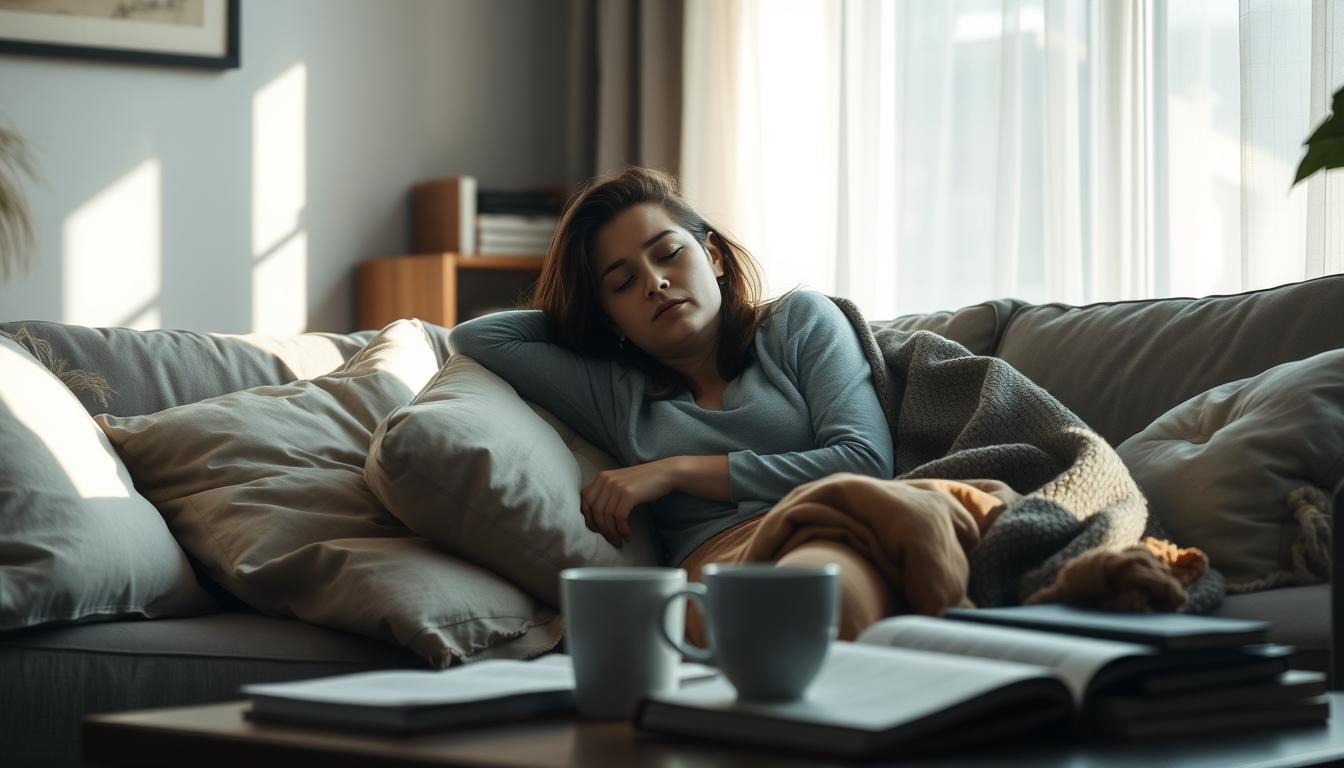Ever felt super tired, even when you’ve just relaxed all day? It’s a weird and annoying feeling many of us have faced. Let’s look into why this happens, and how our bodies react when we’re not active.
Key Takeaways
- Understand the science behind sedentary fatigue and common misconceptions about rest and energy
- Explore the hidden connection between inactivity and mental exhaustion
- Discover how your body responds to prolonged periods of rest, including physical changes and metabolic impacts
- Learn about the psychology behind lethargy despite adequate rest
- Recognize the role of screen time, nutrition, and environmental factors in unexplained weariness
Understanding Why You Feel Tired Doing Nothing
Ever felt tired and lacking energy, even when you’re not doing much? This feeling, called “sedentary fatigue,” is quite common. It comes from a mix of physical and mental factors. Let’s explore what’s behind this puzzling feeling.
The Science Behind Sedentary Fatigue
Being inactive for a long time changes our bodies in small but big ways. It can make our muscles less active, blood flow slower, and our metabolism slower too. These changes can make us feel tired and unmotivated, as our bodies aren’t being challenged.
Being inactive also affects our minds. Too much screen time or passive activities can drain our mental energy. Our brains need stimulation to stay sharp and alert. Without it, we might feel tired and uninspired.
Common Misconceptions About Rest and Energy
Many think resting means we’re recharging our energy. But too much sitting can actually make us feel more tired. Our bodies are made for movement, and not moving enough can upset our body’s balance. This can make us feel tired and unmotivated.
Knowing about sedentary fatigue helps us see why we need to balance rest and activity. It’s key to fight off the tiredness that comes from being too sedentary.

| Factors Affecting Sedentary Fatigue | Impact on Energy Levels |
|---|---|
| Reduced muscle activity | Decreased blood flow and metabolic slowdown |
| Prolonged cognitive inactivity | Mental fatigue and reduced alertness |
| Disruption of physiological and psychological balance | Feelings of tiredness and lack of motivation |
The Hidden Connection Between Inactivity and Mental Exhaustion
Many think that resting and being inactive will boost our energy. But, the link between sitting too much and feeling mentally drained is often missed. Research shows that not moving enough can hurt our thinking, mood, and mental health.
Our brain reacts differently when we’re always sitting. It doesn’t get the stimulation it needs when we’re active. This can cause our brain to slow down, leading to mental tiredness, even if we’ve rested well.
This mental tiredness can affect us a lot. People who feel tired despite resting say they can’t focus, lack motivation, and feel mentally drained. This can hurt our work, creativity, and mood.
| Sedentary Behavior | Impact on Mental Energy |
|---|---|
| Prolonged sitting or lying down | Decreased blood flow, reduced neural connectivity, and mental fatigue |
| Lack of physical activity | Diminished cognitive function, mood disturbances, and reduced motivation |
| Excessive screen time | Digital fatigue, blue light effects, and mental drain |
To fight mental exhaustion from sitting too much, we need to move more. Simple actions like taking breaks, doing light exercise, or short walks can boost our brain and energy.
By knowing how sitting too much affects our mind, we can take steps to stay mentally sharp. This way, we can feel more alive and engaged every day.
How Your Body Responds to Prolonged Periods of Rest
When we spend too much time sitting, our bodies change in ways that make us feel tired. It’s important to know these changes to break the cycle of feeling sluggish.
Physical Changes During Extended Inactivity
Not moving for a long time can make our muscles weaker. This makes it harder to do simple things. Our heart also gets weaker, making it harder to do aerobic activities.
Metabolic Impact of Sedentary Behavior
Too much sitting slows down how our body burns calories. This can lead to weight gain, making us feel even more tired.
Hormonal Imbalances from Lack of Movement
Sitting for too long can mess with our hormones. This can make us feel unmotivated and tired. It’s hard to focus and feel energized.
Knowing how our bodies react to too much rest helps us fight back. Moving regularly can reverse these changes and make us feel alive again.
The Psychology Behind Lethargy Despite Rest
Ever felt really tired and sluggish, even when you’ve had lots of rest? This feeling is more common than you might think. It’s a mix of many factors that affect how we feel our energy levels.
Motivation is a big part of it. When we lack motivation, even simple tasks feel hard. Boredom also plays a role, as our brains need something interesting to do. Without exciting activities or goals, we can’t find the energy to do anything.
Perceived inactivity also affects our energy. Even when we’re resting, our minds might be busy with thoughts or tasks. This mental work can make us feel as tired as if we’d been active.
- Lack of motivation and engagement can contribute to feelings of lethargy.
- Boredom and understimulation can deplete our energy reserves.
- Mentally active rest can be as draining as physical exertion.
To fight lethargy despite rest and chronic tiredness inactivity, we need to stay active, both mentally and physically. Doing light exercise, enjoying hobbies, or relaxing can help us feel alive again.
Understanding the psychological reasons behind our tiredness helps us take action. With the right steps, we can regain our energy and enjoy rest without feeling sluggish.
Impact of Screen Time on Energy Levels
In today’s world, we spend a lot of time in front of screens. This can really affect our energy levels. It leads to digital fatigue and mental drain.
Digital Fatigue and Mental Drain
Being on digital devices like phones and laptops too much can overwhelm our brains. It makes it hard to focus and keep our energy up. The blue light from screens can also mess with our sleep, making us feel exhausted from minimal exertion and unexplained weariness.
Blue Light Effects on Alertness
Blue light from screens can mess with our body’s natural sleep cycle. It can stop our body from making melatonin, the sleep hormone. This can make it hard to sleep, disrupt our sleep, and make us feel tired during the day. All these can lower our energy levels.
To fight the bad effects of too much screen time, we need to make healthy choices. Take breaks from screens, use blue light filters, and do things that are good for our body and mind. Knowing how screens affect our energy helps us stay strong and deal with our digital lives better.
Nutrition's Role in Unexplained Weariness
Feeling tired without much physical activity? It might be what you eat. The foods we choose are key to keeping our energy up. Knowing how diet affects tiredness can help us fight fatigue from a sedentary life.
A lack of essential nutrients can cause tiredness. Without exercise, our bodies have trouble using what we eat. This can lead to imbalances that make us feel weak and tired.
To fight this, we need a diet rich in nutrients. This diet should include:
- Lean proteins for muscle health and recovery
- Complex carbs for steady energy
- Healthy fats for hormone and cell function
- Enough water for our body’s needs
- Vitamins and minerals to fill any gaps
By focusing on our diet, we can beat the tiredness from not moving much. The right food can give us the energy to do our daily tasks, even if we’re not active.
| Nutrient | Role in Energy Production | Food Sources |
|---|---|---|
| Iron | Crucial for the production of hemoglobin, which transports oxygen throughout the body | Red meat, poultry, seafood, lentils, spinach |
| B Vitamins | Essential for converting food into usable energy | Whole grains, leafy greens, eggs, dairy, nuts, and seeds |
| Magnesium | Supports energy production and muscle function | Whole grains, nuts, seeds, leafy greens, avocados |
Breaking the Cycle of Sedentary Sluggishness
Feeling tired all the time, even when you’re resting, can be really tough. But, there’s a way to beat this feeling. It’s about changing our habits and adding simple activities to our day. This helps us feel alive again and break the cycle of feeling stuck.
Simple Movement Strategies
Here are some easy ways to fight the effects of too much sitting:
- Get up from your desk or chair often to stretch, walk, or do some light exercises.
- Choose standing or walking meetings to move more during the day.
- Try a standing or treadmill desk to cut down on sitting time.
- Do quick exercises like jumping jacks or high knees to get your heart rate up.
Energy-Boosting Activities
Along with moving more, try these activities to boost your energy:
- Start a daily fitness routine, even if it’s just for 10 minutes, to get your blood flowing.
- Do outdoor activities like hiking, cycling, or swimming to feel more alive and energized.
- Try different movements like yoga, Tai Chi, or dance to find what gives you energy.
- Make sure to get enough sleep and drink plenty of water, as these are key for energy.
By using these simple tips, you can overcome feeling tired all the time. Remember, small steps can make a big difference in how you feel every day.
Hidden Medical Conditions That Cause Fatigue Without Activity
Lack of physical activity can make us feel tired. But, some medical conditions can also cause fatigue, even when we’re not moving. These conditions can make our bodies feel extremely tired without any reason.
Several hidden medical issues can cause tiredness when we’re not active. Anemia, thyroid disorders, and chronic fatigue syndrome can all make us feel very tired. Sleep disorders like sleep apnea can also make us feel tired during the day.
- Anemia: A lack of red blood cells or hemoglobin can make us feel weak and tired, even when we’re not active.
- Thyroid Disorders: Both hypothyroidism (underactive thyroid) and hyperthyroidism (overactive thyroid) can cause unexplained fatigue.
- Chronic Fatigue Syndrome: This complex condition is characterized by persistent, unexplained tiredness that is not alleviated by rest.
- Sleep Apnea: This sleep disorder can disrupt the body’s natural sleep cycles, leading to daytime drowsiness and lack of energy.
If you’re always tired, even when you’re not active, see a doctor. They can find out what’s causing your tiredness. Then, they can help you get better with a treatment plan.
Environmental Factors Affecting Your Energy Levels
The environment around us can greatly affect our energy and how tired we feel. Things like the lighting in our workspace and the temperature at home play a big role. These factors can either boost our energy or make us feel really tired.
Lighting is a big factor in how we feel. Natural light during the day helps our bodies stay alert. But dim or artificial light can make us feel tired. Changing the lighting in our spaces can help fight fatigue.
Air quality is also key to our energy. Bad air from pollutants or stale air can make us feel sluggish. Good air quality, thanks to proper ventilation and filters, can improve our energy and focus.
Temperature affects our energy too. Being too hot or too cold can drain us. Keeping a comfortable temperature helps us stay energized and productive.
By paying attention to these factors, we can make our spaces better for our energy and health. Simple changes like opening windows or adjusting the thermostat can help us feel more awake and alert. Even when we’re resting for a long time, these small adjustments can make a big difference.
Conclusion: Overcoming Tiredness and Restoring Natural Energy
In this article, we’ve looked at why we might feel tired even when we’re not doing anything. We’ve learned about the science behind feeling tired from sitting too much. We also discovered how being inactive can make us feel mentally drained.
We’ve found out that things like too much screen time, what we eat, and our surroundings can make us feel tired. By making small changes, like moving more and eating better, we can feel more energetic. It’s also important to watch for any health issues that might be causing our tiredness.
The secret to feeling better when we’re not active is to take a complete approach to our health. By making smart choices and focusing on our energy, we can regain our vitality. This way, we can feel refreshed and full of energy, even when we’re not moving much.
FAQ
What are the main reasons we feel tired despite doing nothing?
Feeling tired without being active can happen for many reasons. A sedentary lifestyle and mental exhaustion are big factors. Physiological changes, like reduced blood flow, also play a role. Psychological factors, too much screen time, and health issues are other reasons.
How does the science explain sedentary fatigue?
Sitting for too long can make us feel tired. It affects our blood flow and muscle strength. It also changes how our body uses energy. We need to understand rest and energy better.
What is the connection between inactivity and mental exhaustion?
Not moving enough can hurt our mental energy. It can make us feel less sharp and less happy. This can make us feel mentally tired, even if we’re not doing much.
How does the body respond to prolonged periods of rest?
When we rest for a long time, our body changes. It slows down its metabolism and gets out of balance hormonally. This can make us feel weak and tired.
What psychological factors contribute to lethargy despite rest?
Feeling tired can also be due to our mind. Lack of motivation and boredom can make us feel sluggish. These thoughts can make us feel tired and stuck.
How does screen time affect our energy levels?
Too much screen time can make us feel tired. The blue light from screens can mess with our sleep. This can make us feel exhausted, even if we’re not active.
What role does nutrition play in unexplained weariness?
What we eat affects how we feel, even when we’re not moving. Eating right can help keep our energy up. It can fight the tiredness that comes with sitting a lot.
What are some strategies for breaking the cycle of sedentary sluggishness?
Simple steps can help us feel more awake. Taking breaks and doing activities that boost energy can help. Adding more movement to our day can break the cycle of feeling tired.
What hidden medical conditions can cause fatigue without activity?
Some health issues, like thyroid problems or anemia, can make us feel tired. Even if we’re not active. If we’re always tired, we should see a doctor.
How can environmental factors affect our energy levels?
Our surroundings can affect how we feel. Things like lighting and air quality can make us more alert. Making our environment better can help us feel more awake.















